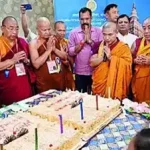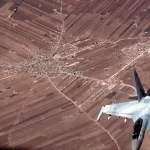- Ukrainian President Volodymyr Zelenskyy will visit Slovakia, Turkey and the Czech Republic to call NATO leaders to take concrete steps towards Kyiv’s membership in the bloc at a summit next week.
- Zelenskyy will visit Turkey for talks with his counterpart Recep Tayyip Erdogan over the Black Sea grain deal and prisoner exchanges, Turkish state media says.
- Ukraine also submitted a formal request to join the Comprehensive and Progressive Agreement for Trans-Pacific Partnership (CPTPP), authorities said.
- Media reports in the United States say the Pentagon is preparing a new package of arms and ammunition that could include the controversial cluster bombs.
Leaders will come together to bring Kyiv into alliance: NATO chief
NATO Secretary-General Jens Stoltenberg says NATO leaders will reaffirm that Ukraine will become a member of the alliance and also discuss how to bring Kyiv closer to this goal when they meet in Vilnius next week.
“For 500 days, Moscow has brought death and destruction to the heart of Europe,” Stoltenberg told reporters in a news conference in Brussels previewing the summit.
“Our summit will send a clear message: NATO stands united, and Russia’s aggression will not pay.”
Kremlin says will ‘closely follow’ Zelenskyy-Erdogan talks
The Kremlin says it will “closely follow” upcoming talks between Zelenskyy and his Turkish counterpart Recep Tayyip Erdogan, describing their meeting in Istanbul as “important”.
“We will very closely follow the results of these talks,” Kremlin spokesperson Dmitry Peskov told reporters.
“It will be interesting for us to find out what was discussed. It’s important,” he added.
At least six people killed in blast at Russian factory
At least six people were killed and two injured during a blast at an explosives factory in the city of Chapayevsk in central Russia, state news agency TASS reported.
TASS said the explosion happened as pipework was being dismantled and that there had not been a fire.
Alexander Khinstein, a member of parliament for the Samara region, said the blast appeared to have been caused by welding and might have been the result of explosive remains being left in the pipes.
Since Russia invaded Ukraine last year, there have been numerous blasts or fires at fuel depots, factories, railway lines and other infrastructure inside Russia.
Authorities have attributed some of them to Ukraine and others to “pro-Ukrainian saboteurs”.
Russia’s budget deficit narrows in June
Russia’s budget deficit for the first half of the year is 2.6 trillion roubles ($28.4bn), narrowing in June as spending fell and revenues increased.
During the same period last year, Russia posted a surplus of 1.48 trillion roubles ($16.2bn). However, supporting its military campaign in Ukraine and dealing with Western sanctions on its oil and gas exports have hit the government since then.
Defence spending has kept Russia’s industrial sector ticking along, spawning forecasts for economic growth this year and helping Moscow to continue its conflict with Kyiv.
Wagner Group paid no visit to barracks: Belarus
A Belarusian official tells reporters that no one from the Russian Wagner Group has visited the camp President Alexander Lukashenko offered them since the mutiny ended.
Asked if Wagner had come to look at the site, adviser to the Belarus defence minister, Leonid Kasinsky, said, “They have not come, they have not looked.”
Under the terms of an agreement brokered by Lukashenko to the rebellion last month, Wagner chief Yevgeny Prigozhin was supposed to move to Belarus along with his fighters who did not sign with the Russian defence ministry.
Kasinsky also said that the 300 tents put up at the disused cap were for an exercise, not for the Wagner Group.
On Thursday, Lukashenko told reporters that Wagner’s founder, Yevgeny Prigozhin, had visited Belarus briefly but was now back in Russia.
What are cluster munitions?
According to senior US government officials, on Friday, the Biden administration is expected to announce that Washington will send cluster munitions to Ukraine as part of a new military aid package worth $800m.
As a signatory of a convention against the weapons, Germany has already said they will not send cluster munitions and that it is “not an option” for them.
Human Rights Watch has also urged the US not to send the weapons.
But what exactly are cluster munitions, and why are they so controversial?
Here’s everything you need to know.
Germany opposes sending cluster munitions to Kyiv
Germany says it opposes sending cluster munitions to Ukraine a day after US officials said Washington was planning to provide Kyiv with the weapons.
German Foreign Minister Annalena Baerbock said Germany, as one of 111 states party to the Convention on Cluster Munitions (CCM), opposed the plan as well.
Asked for comment on what US officials had said, Baerbock told reporters at a climate conference in Vienna, “I have followed the media reports. For us, as a state party, the Oslo agreement applies.”
A total of 111 states signed the CMM banning the use, stockpiling, production and transfer of cluster munitions.
Human Rights Watch also called on Russia and Ukraine to stop using cluster munitions and urged the US not to supply them.
Ukraine, Turkey to discuss grain deal and prisoner swaps
The presidents of Ukraine and Turkey will discuss the Black Sea grain deal and a possible prisoner exchange between Moscow and Kyiv, a senior Turkish official said ahead of Friday’s talks.
A key element of Zelenskyy’s talks in Istanbul with President Tayyip Erdogan will be the fate of the grain deal brokered last year by Turkey and the United Nations.
Russia has repeatedly threatened to leave the deal once it expires on July 17 after it said obstacles to its fertiliser and grain exports are yet to be removed.
Turkey has retained cordial relations with Russia and Ukraine during the conflict.
Zelenskyy will meet the Turkish leader as part of a tour of NATO capitals to encourage them to take concrete steps toward’s Kyiv’s membership at next week’s summit.
Ukrainian troops advance by more than 1km near Bakhmut
A Ukrainian military spokesperson says troops have advanced by more than a kilometre (0.62 mile) in the past 24 hours near Bakhmut.
“The defence forces continue to hold the initiative there, putting pressure on the enemy, conducting assault operations, advancing along the northern and southern flanks,” military spokesperson Serhiy Cherevatyi told Ukrainian television.
“In particular, over the past day, they have advanced more than one kilometre [0.62 mile].”
A spokesperson for the Ukrainian armed forces general staff added that Ukrainian forces had “partial success” near the village of Klishchiivka, just southwest of Bakhmut.
Military analysts have said securing Klishchiivka would help Ukraine take back Bakhmut, which was captured by Russian forces in May.
EU discussing ways to use frozen Russian assets: Czech PM
The European Union is discussing ways to use frozen Russian assets to help with Ukraine’s reconstruction, Czech Prime Minister Petr Fiala said.
“This is not a simple topic, either from a legal or other points of view, but intensive negotiations are also taking place here precisely so that we can also use these frozen assets to help Ukraine,” Fiala said after meeting with Zelenskyy in Prague.
Zelenskyy tells Czech counterpart that Kyiv needs long-range weapons
Ukrainian President Volodymyr Zelenskyy said during his visit to the Czech Republic that Kyiv needs long-range weapons to fight Russian forces.
“Without long-range weapons it is difficult not only to carry out an offensive mission but also to conduct a defensive operation,” he told a joint press conference with Czech Prime Minister Petr Fiala.
“First of all, we are talking about long-range systems with the United States and it depends only on them today.”
Czech PM Fiala says Ukraine’s future is in EU, NATO
Ukraine’s future is in the European Union and the NATO military alliance, according to Czech Prime Minister Petr Fiala.
He made the remarks after meeting with Ukrainian President Volodymyr Zelenskyy in Prague.
The Czech Republic has been a strong backer of Kyiv since Russia’s invasion, and Fiala said on Friday more support would come, including the donation of more military helicopters.
Ukraine ends rescue operations in Lviv after Russian attack killed 10
Ukraine has halted rescue operations in the western city of Lviv and said the death toll had risen to 10 from a Russian missile strike on a residential building.
Regional governor Maksym Kozytskyi said rescuers had worked through the night to clear debris despite heavy rain after a missile hit the building on Thursday in what he called the biggest attack of the war on civilian infrastructure in Lviv.
The city is only 70km (43 miles) from the border with Poland, a NATO and European Union member, and is far from the front lines of the war.
EU members strike deal to boost ammunition production to aid Ukraine
The European Union will devote 500 million euros ($544m) to boosting the production of ammunition for Ukraine and replenishing the stocks of EU member countries, it says.
The European Council and European Parliament representatives have struck a provisional agreement overnight which is expected to enter into force before the end of this month.
Under the deal, subsidies will be given to European arms firms to increase their production capacities and tackle identified bottlenecks.
The scheme is the third part of a broader EU effort to get more ammunition and arms to Ukraine, particularly 155mm artillery shells, which Kyiv has requested.
Zelenskyy to visit Turkey for grain deal talks with Erdogan: Anadolu
Ukrainian President Volodymyr Zelenskyy will visit Turkey on Friday for talks with President Tayyip Erdogan on the Black Sea grain deal and developments in the war in Ukraine, according to the state-run Anadolu Agency.
Turkey and the United Nations brokered last year’s deal, which allows for the export of grain and other agricultural products from Ukraine’s Black Sea ports despite the ongoing war.
But Russia has threatened not to allow it further renewal beyond July 17.
Zelenskyy and Erdogan will hold face-to-face talks and also attend inter-delegational meetings, Anadolu said.
Ukraine requests to join CPTPP trade pact: Japan minister
Ukraine has submitted its request to join the Comprehensive and Progressive Agreement for Trans-Pacific Partnership (CPTPP) to the trade pact’s depositary country New Zealand, according to Japan’s economy minister Shigeyuki Goto.
The CPTPP includes Australia, Brunei, Canada, Chile, Japan, Malaysia, Mexico, New Zealand, Peru, Singapore and Vietnam, with the United Kingdom becoming the 12th member state.
Japan, as a CPTPP member, “must carefully assess whether Ukraine fully meets the high level of the agreement” in terms of market access and rules, Goto told a regular press conference.
Ukraine urges NATO summit to send ‘clear signal’ on membership
President Volodymyr Zelenskyy has called on NATO leaders to take concrete steps towards Ukrainian membership at a summit next week.
He said his country, engaged in the 17th month of the war against the Russian invasion, needed much more than the general statement of more than 10 years’ standing that the door to NATO was merely “open”.
Ukraine is seeking a clear indication from NATO at a July 11-12 summit in Vilnius that it can join the military alliance when the war ends as quickly as possible.
But NATO members have been divided over how fast that step should be taken. Some member countries are wary of moves they fear could take the alliance closer to the ongoing war with Russia.
SOURCE: AL JAZEERA


